Last night’s episode of Star Trek: Discovery gave us a deep dive into Saru and his home world of Kaminar as well as offering some more intrigue with the season’s Red Angel arc. To get some more insight into “The Sound of Thunder,” TrekMovie had a chance to ask some questions via email with Discovery co-producers Bo Yeon Kim and Erika Lippoldt, who wrote the episode.
This episode revealed a lot about Saru and Kaminar, can you talk about the story development process and how much of this was worked out early on?
While we had established the existence of a prey/predator dynamic on Saru’s homeplanet in Season 1, we never had much of a chance to expand on that premise. From the very start of the Season 2, though, we knew we would be visiting Saru’s homeworld, and that’s when we truly sat down to build out the world of Kaminar, what the Kelpiens’ lifestyle was, and who the Ba’ul were. Once we settled on the concept of Vahar’ai, we knew it would take more than one episode to introduce the idea, which is how the Saru storyline in 204 came about. We also wanted to use “The Brightest Star” to establish the mindset of the Kelpiens – that questioning the status quo is taboo – as a way of hinting that there is likely more going on between Kelpiens and Ba’ul.
How has Doug Jones changed and informed the development of the story of the Kelpiens and Saru?
We cannot speak highly enough about how much Doug Jones has brought to this character. His idiosyncratic mannerisms are just the start of it. For one thing, the innate gentleness that comes across informed the idea that Kelpiens (pre-evolution) are perfectly satisfied with a peaceful lifestyle – which is one of the reasons they put up with the culling, to “maintain the Balance.” Another aspect of his performance is his drive to succeed by following the rules. This speaks to how diligently he has had to work, as the only Kelpien in Starfleet, to make it as far as he has – harder than virtually everyone else around him.
So, is the Saru we see in this episode the new Saru, a more in-your-face kind of guy who will continue to butt heads with Captain Pike?
Yes, as a result of Vahar’ai, not just Saru’s biology but also his neurochemistry has changed; this is a new, bolder, no longer fearful version of Saru. That said, the slightly more aggressive behavior was the result of the highly personal nature of this mission. At his heart, Saru is still a highly empathetic and thoughtful character.
Were there any real-world inspirations for the history of Kaminar?
Certainly, we referenced various instances of oppression, and the repression (or attempt at repression) of cultural memories as a way to gain power over another people. One example was the Japanese occupation of Korea, and in particular, the systematic oppression that occurred over the course of 35 years that ultimately shaped Korea and how Koreans behave today.
Is there a reason the Ba’ul kept the Kelpiens around and built this whole elaborate system and mythology instead of just wiping out the potential threat?
While the Ba’ul were nearly hunted to extinction by the Kelpiens, it doesn’t mean they wanted to commit genocide. They have coexisted on this planet with the Kelpiens for thousands of years, and in a twisted way, this is the “Balance” that they have preserved via culling.
As big fans I know you often discuss other Star Trek episodes when developing new stories, were there any that you drew from for this?
We did find ourselves bringing up the Cardassian occupation of Bajor quite a bit, both in terms of the oppression of one species by another, and with regards to General Order One.
Can you make the case for how interference with Kaminar culture on this massive scale fits within General Order One? And does the Federation now have an obligation to stick around to ensure the peace?
The decision to trigger Vahar’ai was indeed a drastic one. We were not able to explore every facet of the argument on screen, but ultimately, it was a decision made by Captain Pike, who was willing to accept responsibility for it. Discovery, through its pursuit of the Red Angel mission, had unintentionally triggered events that put both Saru and Siranna’s lives on the line once they exposed the truth; at the same time, Pike was receiving a request from two Kelpiens to help their people achieve their true, natural evolution, which had been blocked against their will for longer than they could remember. (It was important that Siranna, as the Kelpien priestess, be involved in this decision.) This was the moment where, after millennia of the Kelpiens being silenced, Saru had a chance to give a voice back to his people. Given all of this Pike agreed to help him. And yes, considering the scale of consequences this decision could have, the Federation would help if Kaminar requested it.
Visually, fans are likely to see a similarity between the Ba’ul and Armus, the creature that killed Tasha Yar. Is there any connection?
The resemblance to Armus is merely coincidental.
The Red Angel mystery got a lot of attention. Should we assume that the suppositions discussed are correct and the Red Angel is a time-traveling humanoid wearing a futuristic mechanized suit?
Stay tuned to find out!
We got to see more of Airiam in action. Are we going to learn more about her origin story?
Keep watching to see more Airiam!
Keep up with all the Star Trek: Discovery news at TrekMovie.



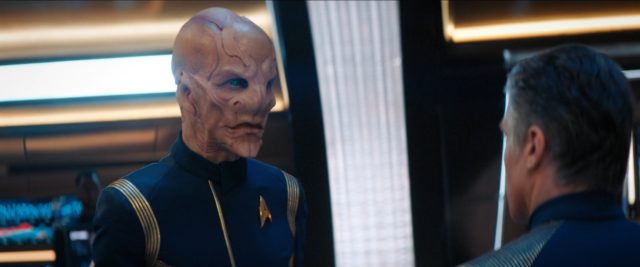
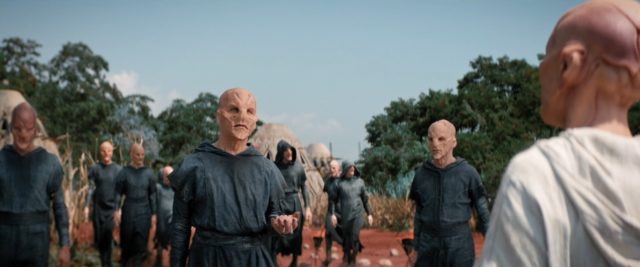
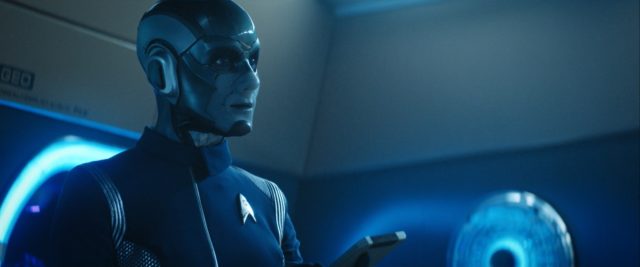
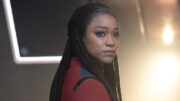
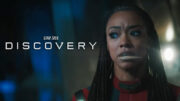
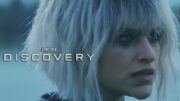
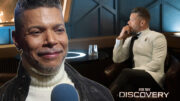
I wondered about Armus as well. Glad that was asked and answered.
We barely know anything about Airiam. Disappointing episode.
Great interview TM!
TBH, after what we got with the explanation with the Ba’ul and Kelpian relationship I kind of would’ve preferred a social oppressive situation like what happened with the Koreans and Bajorans. Only because I have a hard time trying to fanthom how the Ba’ul managed to over come being the prey to become on top biologically. Not only become the dominate species but then manage to become technologically advanced where as the Kelpians never went beyond a primitive society.
But to be fair I’m also thinking about it too hard lol. I guess after thousands of years they could slowly find a way to gain the edge. And they probably wanted to do a different angle to an oppression story so they deserve much credit for trying something different. And maybe its not the last we seen of the Ba’ul.
I guess over the period of time that we’re talking about it’s like asking how a primitive primate became the dominant species on earth…
My thoughts exactly! Try running from a lion in the African savannah without technology!
But they are both sentient species and we know the Kelpians are just as smart as humans because of Saru. I’m having a hard time trying to see how the Kelpians lost their foothold if they were developing at a rate as most normal humanoid species. Or what was the sudden advantage the Ba’ul had to over come such an obstacle? It got to the point the Kelpians saw them as gods. That was the other thing, they somehow convinced them this was just the way life worked and they were doing it out of some great cause? How did that happen? So much of it doesn’t really make a lot of sense to me. But as I said I am probably over thinking it.
Well, maybe they didn’t exactly lose their foothold… maybe they gave it up. It doesn’t take much. Some rebellious Kelpien younglings decide that “Ba’ul are friends, not food”; half a century later it becomes “Ba’ul are people too”; and before you can even realize what’s happening, you have Ba’ul everywhere drinking from Kelpien-only fountains, sitting on Kelpien-only benches, riding in the front part of the bus and tweeting stuff like “Punch a Kelpien” and “Kelpiens should just go extinct”.
You know, basically the same stuff that happened to the Roman Empire. :P
Yeah that’s possible for sure. As I said I am probably just over thinking it. Its hard to say when it is thousands of years of development, I agree. It just so little of it jive with what we were actually shown on screen. Take the Ba’ul and how advanced they have become. But nothing on the planet itself suggests its a warp capable society with an actual technological environment. From what we were shown, it sounds like the entire planet is a mud hut type of existence.
In the Brightest Star that’s why it was assumed the Ba’ul just came from another planet altogether. Now we learned they both developed in the same place, still existing side by side. So where are all the big cities and industries? Where is the modern technology? Since you brought up the Romans, Rome was the most advanced city for its day and spread that advancement as far as it could to numerous other cities and cultures in Italy. Their influence was felt everywhere because they were so advanced.
So where is the Ba’ul’s Rome? Or do they live underwater and there is some type of Atlantis they came from because NOTHING suggests the planet is a technically rich one above ground anyway and why its still confusing. Unless there is a line I forgot somewhere.
But to give the writer’s credit, maybe they have the answers for all of this, but that’s why it feels so incomplete to me. They didn’t develop them enough to explain how any of it was possible. We’re just suppose to believe the Ba’ul is this super advanced race living on the same planet with little evidence of their development or how this turnaround happened.
It was just too much telling and not enough showing I guess.
It’s interesting (though not surprising in terms of their origins) that the writers were thinking of the occupation of Korea and yet gave the Ba’ul such a strong motive to establish the Great Balance, basically out of need for survival (and they didn’t choose genocide at that time!) It would be akin to Koreans having invaded Japan at some previous point, which of course didn’t happen.
I think a much more apt real world analogy would be the actions of the state and military of Israel against Palestinians (and the own Anti-Semitism of the latter), as former victims of Anti-Semites, now that they technologically and politically have the upper hand. But I can totally understand why they wouldn’t want to touch this analogy from ten light years distance ;)
As for how the Ba’ul managed to turn the tables from near extinction, we clearly don’t know enough details about what happened back then (and over such a long time). It is nice, in that respect, that for once the archive of a powerful alien entity was given clear limits (in that it only has records on a macro-level), this certainly helps credibility in how the Sphere records from now on wouldn’t answer all questions Discovery could possibly have.
They didn’t choose genocide but they are still killing them off. Yes they believe its out of their own self preservation but they been doing this for literally thousands of years now. And I don’t see a huge difference when AFAIK all the Kelpians reach this evolution at some point in their life which means they were all going to be killed anyway, it was just a matter of when. There is some disturbing issues happening today but the Israelis aren’t outright killing Palestinians before they get old enough to cut down on potential terrorism.
And if it was this much of a concern, the Ba’ul now have warp capability, they could’ve just moved the Kelpians to another planet or moved themselves. That seem like a better option than just wholesale slaughter. In fact that may have been a better solution when they were beaming them to their ships they could’ve just been transporting them someplace else so not to influence the others (and why were they beaming them anywhere if they both lived on the same planet?). The Kelpians were at Mesopotamian level of civilization if that, they weren’t going to do any space traveling for several thousand years at best.
I think it would’ve went a little better if they actually had the Ba’ul more represented in the story and gave us a clearer picture. I do like the idea of it but the execution could’ve been better IMO.
Tiger, all good points but maybe we are thinking too much like humans. Truly alien civilization, not just in their stereotypical looks but also in their thinking, is something we shouldn’t scoff at as a plot hole necessarily. Especially since these days it seems the typical millennial viewer can find this sort of alien thinking right here on planet Earth! ;)
But I totally agree that we should learn more about the Ba’ul and I keep my fingers crossed there is a sequel to this in season 3!
Yeah maybe and of course I understand we are suppose to get the Ba’ul aren’t just outright evil but the Federation was still there. Why was this even a secret?? Did the Ba’ul look better when they just thought they were killing them because they could? IDK, I’m just really bothered how all this went down lol. This went on for thousands of years and then of course we learn the real truth in 20 minutes and the entire society is instantly changed in one fell swoop. If the Federation knew the truth they probably could’ve done what I suggested and move the Kelpians somewhere else instead of just watching them being killed off. Its not a plothole, its just kind of a stretch how it all happened to me.
Vulcan Soul can you speak Vulcan? Klingon? Andorian?
I speak the language of logic :)
Regardless of some shortcuts with regard to the Prime Directive, this episode represented a much more mature and balanced presentation of antagonists than nearly all previous episodes of Discovery. Making Ba’ul the near-extinct victims of once-genocidal Kelpiens originally to justify the “Great Balance” nicely turned the “antagonists are always ugly” trope (that Star Trek has also adhered to all too often) against the viewers’ expectations, and also made their eventual decision to try to wipe out the Kelpiens in turn much more believable (given that they must have thought their own existinction was coming once again). This near-genocide (without the intervention of the Red Angel) also poignantly illustrated the necessity of the Prime Directive in preventing outside interference – normally it would have been up to the Kelpiens to overturn the Great Balance out of own force (which would presumably been at a time when the Ba’ul couldn’t wipe them out so easily with technological superiority). Nevertheless, the conclusion was still an amicable one in true Star Trek fashion, in that the Kelpiens would not seek retribution for either the Great Balance or the near-genocide but try to establish a peaceful coexistence with their former tormentors/victims. Chapeau!
I do wish there had been time to see a hint of the interactions between the newly evolved Kelpians and the Ba’ul. But I’ll wager that we will see Kaminar again, and find out just how much damage Discovery did when they “bent” the Prime Directive.
I think this is the biggest disappointment to many who didn’t love the episode, there just wasn’t enough interaction with the Ba’ul. They were put there to look ominous and evil but very little in terms of actual development. But hopefully you’re right and we will see Kaminar again along with the consequences of what Discovery did for better or for worse.
That is the price of serialization which everyone seems to love here so much: multi-parters dedicated to a (more or less) stand-alone mission are a thing of the past now. Ultimately this mission is just meant to feed into the bigger, and more important arc as well and as such cannot take up too much of those limited (less than) 13 hours of screentime. I’m certainly not arguing pro serialization here as we had to suffer it in some of the “cut-up soap opera” pieces choke-full with competing storylines this season, as otherwise this episode marked a clearly superior approach: one stand-alone-ish main story, informed, but not surpassed by the arc, with all side-story lines taking a clear backseat (Section 31, Spock, Culber) and otherwise fitting nicely with the main theme. To borrow from a certain former president, this is serialization we can believe in ;)
They seem cool. I wish I liked their episodes more than I do.
Same
Try a little harder.I remember a time when fans bash the hell out of next gen for at least 2 seasons then things changed .Season 3 took off and the rest was history. DS9 same thing. Fans are strange, they want what was before and missing the point Roddenberry himself said Star Trek has many stories to tell.To think this show would be anything like TOS or next gen is crazy. You have a new young audience that views Star Trek different then we did in our day.It’s also a business and ratings is a part of that business. Could they do better sure, but opinions are like ”a holes” everyone has one, you can’t please everyone and the producers of the show won’t go there, its impossible. It’s lucky we even have a tv show called Star trek ,lets support it and we get more.
Tiger2 it’s lucky we have Star Trek, Star Wars whatever. Show it some love.
Huh?
I am showing it ‘love’ by supporting the show and PAYING for it! Which I have been one of the few people who had no issue with that from day one. And I have been overwhelmingly positive about this season, certainly way more than season 1 which I was mostly on the fence with.
But you act like we can’t give our true thoughts about it on a message board. That I’m not supporting the show if I’m critical of it? This is sadly the biggest misnomer in fandom that to be critical is that you want to hate it when in reality it could be the complete opposite. In fact season 2 seems be almost an entirely different show with a new direction BECAUSE so many people like me were so critical of season 1 in the first place. And we thankfully have a better show now, one I said many times has improved for the better.
It still doesn’t mean its perfect however and people should feel comfortable to give their opinion without being accused of wanting to hate the show. And I have said I didn’t hate the episode, I was just let down by it mostly but still liked it.
Tiger2 I see where you’re coming from. I’m sorry I offended you. What I’m trying to say is in this day and age of hate, we need to love each other more. Star Trek is the only optimistic TV show out there. Dark and violent TV shows like Game of Thrones or The Walking Dead is not what we need right now in this dark times. There is a light beyond the tunnel. Star Trek is the hope for a better future for our grandchildren and ourselves.
Well OK and I probably was a bit too defensive about it, so apologies. But your statement is a bit ironic since one of the biggest complaints (out of many) with season 1 is that it did feel too dark and violent, like they were trying to turn it into Star Trek’s version of GOT, especially with all the crazy back stabbing and turns. That is also why people seem much more receptive to season 2 because its starting to feel like the positive and optimistic show people fell in love with in the first place.
What’s funny is how both seasons had a captain that seem to represent each of its tone. Season 1 had Lorca who came off dark and cynical who you couldn’t trust with his own agenda. And we saw how that worked out. But he represented everything that is NOT Star Trek. Now season 2 has Captain Pike who is transparent, optimistic and believes in the Federation values with zeal. It really is a big change between the two and for the better.
But please don’t mistake my criticism of an episode for my general satisfaction for this season as a whole. This season is bringing me back to the Trek I fell in love with in the first place. First season not so much lol. And I didn’t have an issue with the premise of the episode, its once again doing what Trek does best, adding elements of science, adventure and philosophy that makes up the ingredients of a good Trek story. Its just the execution of it I was disappointed by mainly.
Now that we finally got a closer look, it’s obvious: Red Angel is future Tilly. I mean, did you see those hips? :p
It was a good episode, though. Definitely best since 2×01 (and possibly better than 2×01, too). Not as cinematographically annoying as some of the previous ones, and the story was quite decent too (aside of some entirely avoidable “Deus ex sphere”).
Why couldn’t we get stories like this from the beginning? How is it possible that they are ONLY NOW starting to understand what their audience actually wants?
Ash Tyler joined section 31. What is he doing on Discovery again? I’m happy Culbert is back. Culbert and Stamets are a great Star Trek couple. I guess the spore drive is Dead.
Tyler is the liaison for Section 31 on Discovery since they are also looking for Spock and collecting intel on the red bursts/red angel which they believe could be hostile and therefore a threat to the Federation. And doubtful the spore drive is dead.
Tiger2 I recently signed up for CBS All Access. I’m on the 1 week free trial right now. I have the commercial free subscription. I’ve been watching Star Trek Discovery since the day it came out without CBS on the internet. I agree with you that season 1 was really bad. I don’t like the Klingon war storyline. I’m happy that’s over. Not every episode is perfect but season 2 is an improvement. I hope Star Trek Discovery has a stellar season 3. I watch Star Trek on Netflix.
So we’re in complete agreement then! :)
Yes I thought season 1 was pretty bad, namely how it handled the Klingon war. It was dull, excessively violent and lacked any nuance or tension. And the war itself was just set up badly. We got a war story line that spent most of its time never showing us the war. It just wasn’t executed very well. I have said this in the past but what saved the season for me were the Mirror Universe episodes, which weren’t perfect either but had a much more satisfying story line at least. If it wasn’t for that though and the other few non-war episodes like The Sanest Man and Lethe, I think I would’ve hated first season completely. So much of it just felt really off and Star Trek in name only.
So I’m thankful someone rewatched the past shows for season 2 and remembered what people loved about Star Trek in the first place. And that was mainly for science, mystery, exploration, philosophy, adventure and yes, optimism. That was the key ingredient missing last season but this season its just nice to see people believing in uplifting others again, even if they argue on the best way to do that. But the debate of taking action in itself possibly causing harm even if its with the best intentions has always been an important part of the dialogue in every Trek show from TOS to Enterprise. That’s why the Prime directive was one of the best ideas created in Star Trek. Its just great seeing stuff like this again and why season 2 is a breath of fresh air even if they all haven’t been winners.
Thanks for this interesting exchange! I have a different feeling about season 1. I think in many ways it resembled the last seasons of DS9, with the big difference that with Disco the audience hadn’t had a chance to get to know and become attached to the characters before war erupted. DS9’s creators said at the outset that they wanted more dramatic conflict than was possible on TNG and to see how Federation values really stood up when tested. I think that’s what Disco season 1 wanted to do as well, particularly in the personal journey of Burnham.
Federation values really were ambiguous, however, right from the get go in “The Vulcan Hello.” Vulcan policy toward Klingons is to shoot on sight!?!? Cold logic leading to moral bankruptcy? Even if Federation principles hadn’t fully congealed yet, Capt. Georgia was pretty definitive when she declared, “Starfleet doesn’t shoot first!” How could Vulcan and Starfleet have such opposite policies? That’s what started Burnham down the road to mutiny, the need to (re)discover Federation principles through the sojourn in the Mirror Universe, and then to remind the Federation of those values when it had decided (urged on by Sarek?) to seek genocide.
Now in season 2, Federation principles are more in evidence and it’s Rodenberry’s aversion to religion that’s being probed.
Just some thoughts.
And great thoughts there Elrond!
I’m in complete agreement. Although I love the optimism Trek presents in general, DS9 also happens to be my favorite Star Trek show because of how it questioned those ideals in a time of crisis. Sisko said it best, its easy to be a saint in paradise which the Federation basically was. Its when you strip that and your creature comforts away and asked can you still hold true to those ideals? That’s what made DS9 so fascinating to watch. And it wasn’t a black or white answer, like most things in DS9, everything was presented in a shade of grey. It made Star Trek a more interesting and layered show that was only hinted at with the others.
And I truly think that’s what Discovery was trying to do in its first season as well, live in the more grey area of Star Trek. In fact I brought it up in another article that DIS was trying to mimic what DS9 did, just did it poorly. And I guess so poorly no one agreed with me lol. But your post is exactly how I saw the show too and it was trying to be DS9 from season six on. It was just executed badly. And I also think fans rejected it because after 12 years of not having a show on they wanted something more traditional and a return to form where as the makers wanted to shake Trek up again ala DS9. I think that was the problem too, fans wanted TOS and TNG reborn while the producers looked at the sci fi landscape of today and wanted something grittier and darker. If it was better executed maybe it would’ve worked.
Now its a return to form and probably for the better.
Well, Tiger, I guess I’m a bit more positive about season one, always a rough settling-in period for the production of new shows. It takes a while for everything to gell, especially when juggling so many different continuity elements. All in all, I think it came together ok, if a bit rushed at the end, and the cast is great. I’m eager to see how the rest of season two unfolds.
Even though I was always critical of season 1 I said it over and over again that DIS wasn’t going through anything differently than every other show before it. I never treated DIS any differently in THAT regard than the others in their early seasons and was aware that they all improved with a little time and hindsight.
And I was also aware the show had a huge change over before it even began and the guy who envisioned it all, Bryan Fuller, got the boot before they even started filming. That was the first time something like that happened in Star Trek. Show runners have been fired before but that’s usually after the fact and not before.
Despite my problems with season 1 I always maintained fully the show could definitely improve and even be a great show on its own right someday because we seen it happen with others like TNG and DS9. So I had no problems being critical because I was hoping like most they take that criticism to heart and it looked like they did. And my other feeling is a lot of them DIDN’T exactly like what Fuller laid down, it was simply the hand they were dealt with and made the best of it. Season 2 seems to be the direction others wanted as well.
Its also why its eye rolling when I hear people say things like ‘If you don’t like the show then you should stop watching’ missing the entire point. That’s WHY you watch it, to give insight and hopefully see it improve with time. Now its paying off. ;)
Tiger2 can you speak Klingon? Vulcan? Andorian? I know a friend who can speak Klingon.
LOL no I don’t know any Trek languages besides the one or two words I remembered from the show. I really just enjoy watching Star Trek, I have very little desire to live in it.
Elrond Star Trek Discovery season one is not like DS9. The Dominion War and the Klingon war are different events that are 100 years apart. The Picard show will go into the 25th century.
Prof, yes indeed. I was speaking of their similarities between the Dominion and Klingon Wars as tests of Federation values (maybe best seen “In the Pale Moonlight”), not that they were the same conflicts or in the same century. They also had similar serialized formats, though Disco from the outset.
Great interview and I think their story had a great foundation and intent. Fleshing it out however left a little to be desired. Two main points:
1. I think the writers missed the fact that in Star Trek lore, I really think that strict adherence to The Prime Directive (TPD) is a guiding principle of the Federation. Yes I know TOS played fast and loose with this notion but TNG dealt with it in a much more thoughtful way and even Enterprise started the idea, with the Captain and crew willing to die for preserving the spirit of non-interference. As I said, I know TOS didn’t treat it with the same reverance but there are a lot of things about TOS that can be ignored and this is one of them. In the end I guess we can say that the Federation and its officers evolved a much more rigid interpretation of TPD between the time of Discovery/TOS and the time of TNG. It is afterall about 90 years pre-TNG. Maybe 20 plus years of civil war on Kaminar is a lesson that was learned.
2. Chain of Command. I think Discovery needs to carefully consider how it treats chain of command. I for one liked the fact that Prime Captain Georgiou arrested her first officer and threw her in the brig for her actions in the series premiere. Saru’s insubordination and actions, although well intended, IMO definitely deserved some consequences. The writers should have had a scene where Saru went to see Pike at the end of the show, apologizing or surrendering himself for discipline for his earlier actions. I know Pike is NOT the central figure but perhaps Saru instead could have explained to Michael how such a discussion went down with both of them learning an important lesson from the way Pike reacted to Saru’s apology.
Just a couple of thoughts.
Okay, I believe the Red Angel is ZORA, Discovery’s A.I. from the future. Red Zora is a famous band of orphaned youngsters in European literature. Red + Zora = Red Angel…
Zora also means “Dawn” in Serbocroatian and there a some links to a biblical place name and well as the morning star and evening star, a guardian of time and space… so, ZORA may indeed be the Red Angel…
In addition, Erika Lippoldt seems to be of German origin. I can’t find any biographical details about her, but the name indicates she has at least German ancestory. The book “Die rote Zora” (Red Zora) is set in former Yugoslavia, but it was written by a German author. So she might be familiar with it.
The weakest aspect of this season is the overall story arch of the season. Strong writing overall but remove the Red Angel and Spock and it still stands on its own without it.
Establishing Michael as Spock’s sister just seems to be weighing down the creative direction of the show. She could easily have been raised by any Vulcan without the baggage of having to make the pieces fit into what is already known about the relationship between Sarek and Spock. A human raised by a Vulcan and as a Vulcan is a great angle to work from and would represent an interesting parallel to Spock as a child raised as a Vulcan though half human. It was a missed opportunity. What we have instead is the story of the child Sarek always really wanted and the sibling who resented the relationship. Gotta pin that one on Fuller who really should have known better.
Wow its amazing how much we are in agreement about this. I really do like the Red Angel plot line and its a fun mystery to keep people guessing but its obvious its really just being used as an excuse to tell the other stories which have been pretty strong overall. Seeing how they designed the season I would’ve been fine if we just got these stories in more standalone form but I definitely understand why they didn’t do that. People today want a big and long story and what the Picard show will be doing as well. I just worry it may be a let down but no matter what it is it will still be 100 times better than the Klingon war. ;)
And agreed about Spock and Sarek in relation to Michael but I’ve said that enough at this point. It is what it is. Hopefully we’ll get a really interesting story out of it by the time the two do meet but right now its feeling too melodramatic and soap operaish for me. And they really squandered Michael being half Vulcan. That was the one thing I was actually excited about to see and they have done nothing with it other than throwing out a reference she was raised on Vulcan.
If it wasn’t apparent before, I think at this point is is obvious that the human raised by Vulcans concept will never get explored. (lost opportunity) The only reason for it was to create a connection to Spock to use if producers felt it was needed.